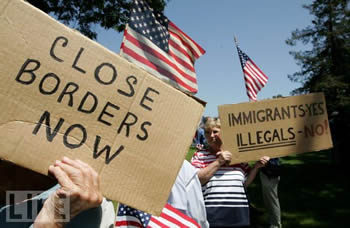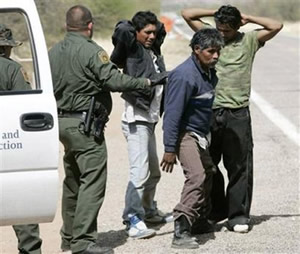Believers without Borders:
Christian Ambivalence on the 4th of July
For Sunday July 4, 2010
Lectionary Readings ( Revised Common Lectionary , Year C)
2 Kings 5:1–14 or Isaiah 66:10–14
Psalm 30 or Psalm 66:1–9
Galatians 6:1–6, 7–16
Luke 10:1–11, 16–20
Both my wife and my daughter were born on the 4th of July, so this time of year is always a special one for my family. This year there's an added bonus. By a coincidence of the calendar, the 4th of July falls on a Sunday. So while Christians around the world celebrate the resurrection of Jesus on our sacred holy day, American citizens will celebrate the birth of their nation on its secular holiday.
This juxtaposition underscores an essential and awkward Christian truth — there's a world of difference between being Christian and being American. The two are by no means the same. To be Christian demands an absolute, unconditional, and ultimate allegiance to an Infinite God, whereas allegiance to a nation, state, or ethnicity can only be relative, conditional, and penultimate. I thus like to ask myself, "what parts of my personal identity are merely American, and what parts are authentically Christian? How, when, where and why do these two identities clash and converge?"

|
All four readings this week emphasize how our identity before God is more important than our political pledge of allegiance.
Naaman was a quintessential "foreigner" from pagan Aram (= Syria), a military officer of a major enemy of Israel. The narrator praises Naaman in glowing terms: "He was a valiant soldier, a great man in the sight of his master and highly regarded." Then he ads a shocking detail: "through Naaman the Lord had given victory to Aram."
Wait a minute. God gave victory to Israel's enemy through a pagan commander? Yes.
Naaman also had a skin disease. This disease caused Naaman some medical problems, but his real complications were social, religious, and moral, for people with such "impurities" were stigmatized as ritually unclean and therefore excluded from God's community. But not in this story, for God also heals the enemy military commander (2 Kings 5).
The story ends with a tragic reversal when greed overtook Elisha's servant Gehazi. He connived to obtain the gifts that Naaman had offered to Elisha but which Elisha had refused. Gehazi, the "insider" of Israel's prophet Elisha, was then struck with the skin disease that originally afflicted the "outsider" pagan military commander Naaman. "The story that began with this disease ends with it," writes Frank Spina, "with the difference that its victims have been reversed: the Aramean outsider has become clean, and the Israelite insider has become unclean."
The last page of Isaiah's long prophecy celebrates how God works far beyond the borders of Israel to include " all nations and tongues." You need a Bible atlas to take it all in — Tarshish, Libya, Lydia ("famous as archers"), Tubal, Greece, the "distant islands," " all the nations" and, as if all that was not enough, " all humanity " (Isaiah 66:18ff).
The ancient poetry of the Hebrew psalmist affirms how God engages "the nations" (plural) and "all the earth" (Psalm 66).
And in the gospel for this week Jesus warns about another religious insider-pagan outsider reversal. He says that divine judgment will be more tolerable for infamously immoral Sodom, and for Israel's foreign rivals Tyre and Sidon, than for Chorazin, Bethsaida, and Capernaum, places where Jesus lived and performed many miracles but people did not believe (Luke 10).

|
In his book The Legacy of the Second World War (2010), the historian John Lukacs honors patriotism but warns of nationalism. Many aspects of patriotism are natural, good, and even admirable. People rightly love their unique ethnic roots, foods, history, language, culture, and music. Homesickness is a compliment to the sights, sounds and smells which we love and miss when we are separated from them.
But there's also a toxic patriotism like what Lukacs calls nationalism (and in his view it was the genius of Hitler to exploit such nationalism). Nationalism, as CS Lewis observed, believes that my nation is "markedly superior to all others." Lewis once encountered a pastor who espoused such noxious nationalism, and asked him, "doesn't every nation think of itself as the best?" The clergyman responded in all seriousness, "Yes, but in England it is true." Lewis concludes, "To be sure, this conviction had not made my friend (God rest his soul) a villain; only an extremely lovable old ass. It can however produce asses that kick and bite. On the lunatic fringe it may shade off into that popular Racialism which Christianity and science equally forbid."
Christians ought to be geographic, cultural, national and ethnic egalitarians; for us there is no geographic center of the world, but only a constellation of points equidistant from the heart of God. Proclaiming that God lavishly loves all the world, each person, and every place, the Gospel does not privilege any country as exceptional.
Much has been written about American exceptionalism. In terms of economic, political, military, scientific and cultural dominance, America might be unrivaled, and in that sense "exceptional." Some aspects of American exceptionalism are clearly good, and the 4th of July is a good time to celebrate them, but other parts of our "exceptionalism" are unquestionably bad. Nor is there any guarantee that American exceptionalism will continue, for history teaches us that even the mightiest civilizations come and go.
More importantly, from a theological or Christian point of view, America is no more "exceptional" in God's eyes than any other country. While allowing for a natural and wholesome love, even pride, in your own country ("there's no place like home"), our geo-political egalitarianism subverts the claim of absolute allegiance to any one nation. Our ultimate citizenship, said Paul, is spiritual rather than earthly (Philippians 3:20).
Christian global vision asks that we care for every country and people as much as we do our own. America has a complicated problem with 12 million illegal immigrants, to take just one example, and no obvious solution is forthcoming. But while politicians blame each other to score political points, Christians do well to recall God's words to ancient Israel: "Do not mistreat an alien or oppress him, for you were aliens in Egypt. . . You are to love those who are aliens, for you yourselves were aliens in Egypt" (Exodus 22:21, Deuteronomy 10:19). And from Leviticus 19:34: "When an alien lives with you in your land, do not mistreat him. The alien living with you must be treated as one of your native-born. Love him as yourself, for you were aliens in Egypt. I am the Lord your God."

|
There's no such thing as a "Christian" politics, and efforts by all political parties to co-opt Jesus badly distort his message. The Jesus of the Gospels proposes no political program, but something far more strenuous, something that historian Garry Wills calls "scary, dark and demanding." No state or political party, says Wills in his book What Jesus Meant , can indulge in the self-sacrifice that Jesus demands when he asks his followers to lovingly serve the least and the last wherever we find them. But what's impossible for a state is compulsory for a Christian.
An early work called the Letter to Diognetus (c. 130 AD) captures the believer's ambivalent relationship between our geo-political identity and our Christian confession (5:1–5, my emphasis).
For the Christians are distinguished from other men neither by country, nor language, nor the customs which they observe. For they neither inhabit cities of their own, nor employ a peculiar form of speech, nor lead a life which is marked out by any singularity. The course of conduct which they follow has not been devised by any speculation or deliberation of inquisitive men; nor do they, like some, proclaim themselves the advocates of any merely human doctrines. But, inhabiting Greek as well as barbarian cities, according as the lot of each of them has determined, and following the customs of the natives in respect to clothing, food, and the rest of their ordinary conduct, they display to us their wonderful and confessedly striking method of life. They dwell in their own countries, but simply as sojourners [or resident aliens]. As citizens, they share in all things with others, and yet endure all things as if foreigners. Every foreign land is to them as their native country, and every land of their birth as a land of strangers .
Like people in every nation, Christians reflect their particular time and place. We support and enjoy our various countries, but only as if we were resident aliens. We experience an ambivalent and divided loyalty — ultimate loyalty only to the city of God and its "politics" of self-sacrificing love, and merely penultimate loyalty to the city of man and to what Diognetus calls its "merely human doctrines." In the end, we honor "every foreign land" as if it were our own, and experience our own country as a "foreign land."
For further reflection :
* Consider the counsel of Origen (185–254 AD) from Against Celsus , Book VIII, Chap. 73:
And as we — by our prayers —
vanquish all the demons that stir up war,
and lead to the violation of oaths,
and disturb the peace,
we in this service
are much more helpful to the kings
than those who go into the field
to fight for them.
And we do take our part in public affairs,
when along with righteous prayers,
we practice self-denying disciplines and meditations,
which teach us to despise pleasures,
and not to be lead astray by them.
And none fight better for the king
[and his role of preserving justice]
than we do.
We do not indeed fight under him,
although he demands it;
but we fight on his behalf,
forming a special army of piety
by offering our prayers to God.
From the Englewood Review of Books (May 1, 2009). Quoted in Water, Faith and Wood: Stories of the Early Church’s Witness for Today , by Christopher Smith (Doulos Christou Press, 2003).
Image credits: (1) www.iguanabio.com ; (2) Asset-cache.net ; and (3) Our Voice; A Forum for Change and Accountability .





